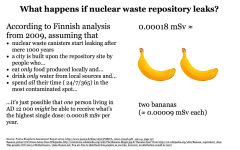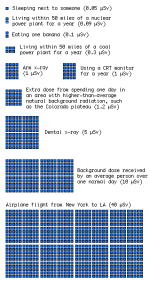At the end of the day if you are pro nuke, is it ok in your bavkyard?
Yes. I would happily have an SMR in my backyard. A full size GW scale power plant wouldn't fit; But I would be OK with it being built right next door.
If it was iproposed in your neighborhood, would object in public meeting?
Not only would I not protest, I would go along to press the case for constructing it, and hope to persuade my neighbours of the benefits.
There are a number of regulations that across industry are probably too limiting or unnecessary.
Probably. But Nuclear Power really takes the cake. Regulation needs to be proportionate to risk. Nuclear power regulations are wildly disproportionate.
That being said environmental regulations on contaminants usually have a science basis. When I was just a factory worker in the 70s I used to clean my hands with MEK, methyl ethyl ketone a strong solvent. It was widely used in manufacturing to clean items wirth little restrictions. Along comes OSHA who says all chemicals used in industry must be properly contained, laneled with hazarf level, and an MSD or Manufacturers Safety Data Sheet detailing risks, handling, safety.
All of which seems perfectly reasonable. The Chemical industry has a WOEFUL history of accidents, large and small, with about 3 deaths per annum in the USA (and of course vastly more in the developing world). The nuclear power industry has a total of zero deaths in the USA (or indeed in the entire world excluding the Soviet Union) in entirety of the sixty years that it has existed; It would therefore be more than reasonable to regulate nuclear power at a similar level to the level at which chemical plants are regulated.
It costs manufacturers money to comply. Industry will always complain about regulations. Up through the 70s circuit board manufacturers dumped liquid waste down the sewers. Now they are required to store it in holding tanks and have it treated. Plenty of examples I know first had. Integrated circuit manufacturers use phosgene gas.
It costs nuclear plant operators more to comply with regulation than the rest of their costs combined. More than half of the workers at a nuclear power plant are engaged in regulatory compliance activities.
Of course the nuke industry will complain about regulations. I expect waste regulations are based on statistical estimates based on experiment with living organisms. Hiroshima and Nagasaki were used extensively over generations to develop statistical models from residual background radiation.
Well, you expect wrong.
The most commonly used model is the Linear No Threshold (LNT) model. Under this hypothesis, it is assumed that 1Sv of exposure is equally risky if received as a single dose over a few seconds, or if received as 50mSv per year for 20 years.
This makes as much sense as saying that as a fall from the 10th floor of a building will kill you, so must walking down the 500 stairs, each 200mm high.
The LNT model MASSIVELY overestimates the risk of low doses of radiation; taking the results of high doses received almost instantaneously at Hiroshima and Nagasaki and extrapolating them using this model leads to crazy results. These crazy results are what the "environmentalist" movement have demanded be used by the nuclear industry.
Even lowest level waste like garments need to be accounted for, unless you think they should go to the local landfill.
Why shouldn't they, if they are not contaminated? Radioactivity is very easy to detect; There's no reason not to scan them and landfill the ones that are clean. Or better, launder them and use them again. And even contaminated clothing isn't sufficiently radioactive to be hazardous. People live long and full lives in places like Ramsar, where natural radioactivity is around 260 mSv/year. Why then are radiation workers limited to 20 mSv/yr? Why should we worry about a landfill that has a few old lab coats in it that would give a person who slept on them every night an additional 0.00001mSv/yr of exposure above background?
Why do such garments need to be accounted for? What's the benefit of doing that? All it achieves is to make nuclear power needlessly costly. Without saving a single life, or even preventing a single illness.


